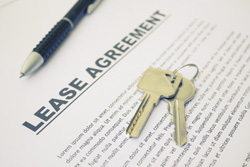by Jeff Grandfield and Dale Willerton

When planning to lease a space for your business, you will want to prepare yourself for lease negotiations with a commercial landlord, also known as the lessor. One of the most important steps you can take is to ask plenty of questions to better protect yourself, your interest and your investment. Here are a few recommended questions:
1. Who is the Landlord?
Will you be dealing with a large institution, a bank or a small independent “Mom and Pop” landlord? Different ownership requires different negotiating strategies. Large institutional landlords are slower and often handle leasing matters through a board or committee – rather than one individual. Therefore, there may be some delay with the landlord’s response time to an offer to lease. Furthermore, that large institutional landlord may be located in another city, and dealings will be primarily by phone, e-mail, or local representatives. Smaller landlords are typically more local and more accessible.
2. How long has the Landlord owned the property?
Many commercial landlords have been in business for 10 years or more. “New” landlords are generally a rarity. Established landlords can be classified as either “holders” or “flippers.” Holders will keep the property long-term and work to increase its value, while flippers may quickly resell the building for a profit. A new landlord may know less about the property overall and may have a new building mortgage. If this is the case, be aware that the new landlord may charge tenants higher-than-market rents to help cover a high mortgage cost. Long-time landlords typically have more detailed knowledge and hold realistic rent expectations of their tenants.
3. Where is the Landlord located?
A local landlord is frequently accessible, thus making it easier to deal with potential problems before and after signing the lease. Out-of-town or out of state landlords may not respond as quickly as someone located locally.
4. Is the property manager local?
Ensure that the property manager is readily available to deal with any concerns you may have. Property managers may look after multiple sites, and if the sites are not all in the same town or city, the property manager may be out of reach when you need him/her. Be sure to request the manager’s emergency contact information – just in case.
5. What is the building’s history?
An older building may require significant maintenance, for which tenants, both franchise and independent, may be responsible. Most maintenance fees are paid via Common Area Maintenance (CAM) charges. Are you prepared to invest money into an old building?

6. Who is doing the leasing for the property?
Landlords handle leasing in different manners; they may deal with the leasing themselves, hire in-house leasing staff, or turn the listing over to a real estate agent. Each party will have a different motivation for seeing the deal signed, plus each will be more or less knowledgeable about the property. Be sure to ask the property owner up front as to who will be handling the leasing details.
7. Who were the two most recent tenants to move in and when?
If you are looking to rent in a multi-unit property, ask for contact information for the most recent new tenants. Approach these tenants and ask them about their lease negotiation experience. Pay attention to any concerns they may have had. The listing agent or the landlord can provide occupancy records for previous and recent tenants.
8. Who were the last two tenants to move out?
For any retail space, the leasing agent will be able to answer this question, but you may want to ask other tenants in the building for more facts. When and why did the formers tenants move out? Were they unhappy with the building and moved elsewhere? Did they retire or sell their business? Why did they leave? What were their opinions of the landlord?
9.Who is the property’s biggest tenant – the anchor tenant?
If you are considering a multi-unit space, this question may be the most important for your business success. How secure is the anchor store’s tenancy? The anchor tenant typically attracts the most traffic to a property so you will want to confirm that they will be staying. The leasing agent with whom you are dealing should be able to confirm this information for you.
10. Is the building for sale?
Due to the number of limited qualified buyers available, commercial buildings are not advertised for sale in the conventional way with a conspicuous “For Sale” sign posted out front. Instead, commercial properties are offered to other landlords through a commercial property website. Building owners looking to sell their building will have different motivations towards prospective tenants. Before signing a new lease, understand whether the property owner is looking to hold the property, or looking to sell it.
